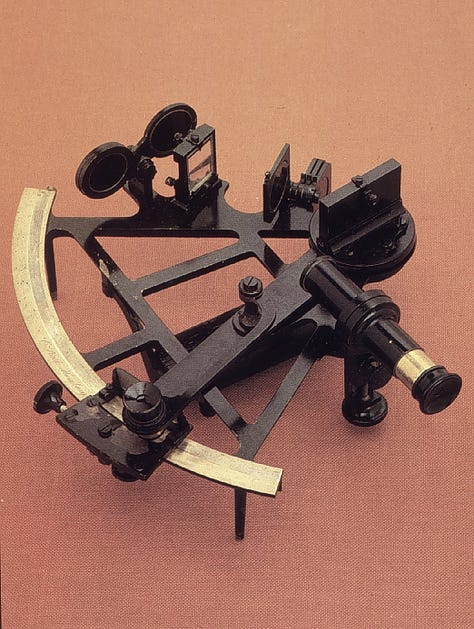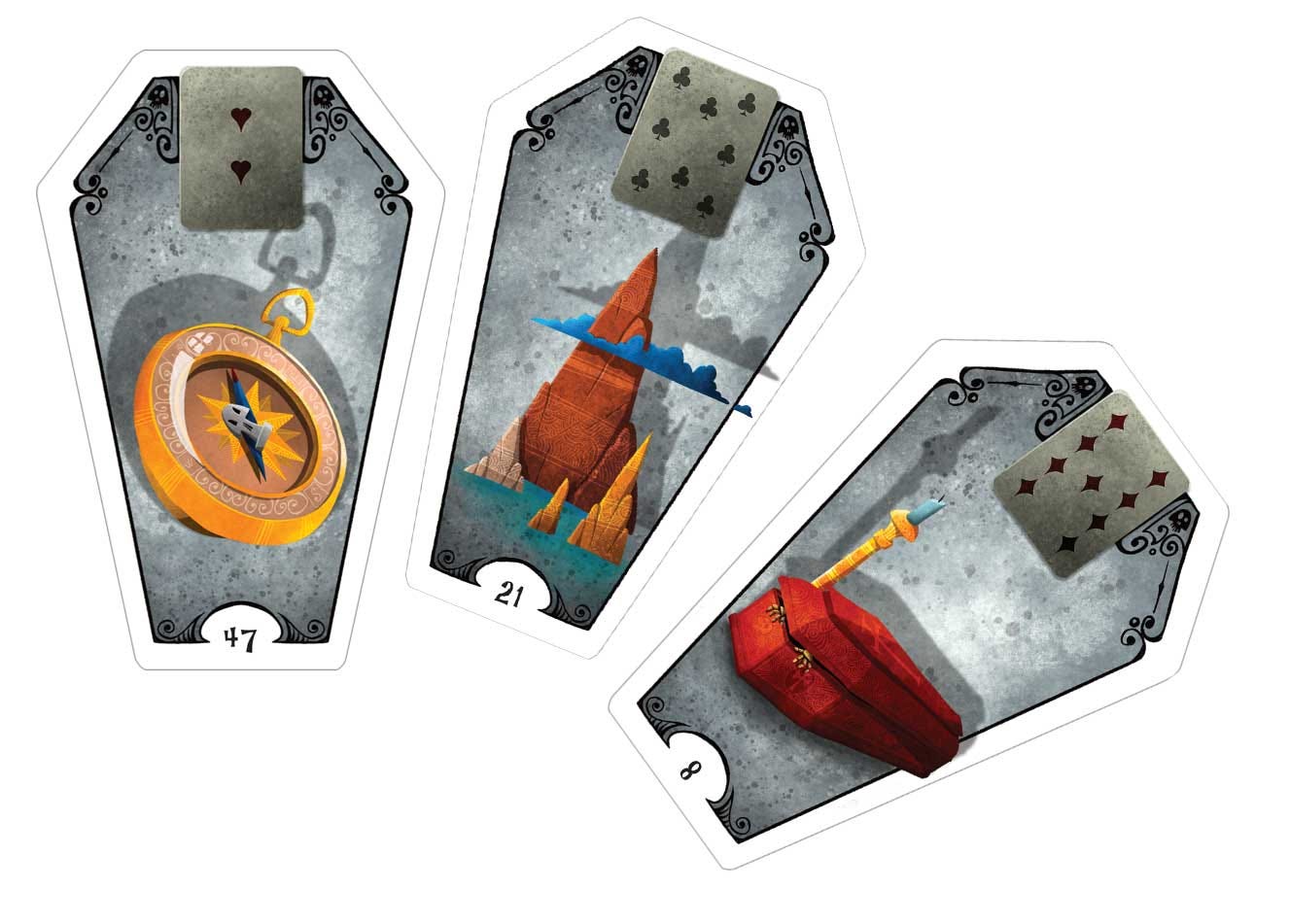Astrolabes, compasses, sextants, and other ancient navigation instruments have always fascinated me—not only for their technical aspects, the science behind them, and their practical uses, but also for their beauty. Often these were prestigious instruments, costly and crafted with extreme care, and they became genuine works of art. So, how could I resist including an extra card dedicated to one of them? The choice was anything but easy. Initially, I focused on the sextant and its precise method of use. But it’s neither intuitive nor easy to use! So, I opted for something more familiar to our everyday experience: the compass.



Have you ever wandered in a forest with just a map and a compass? It’s an incredible experience. The compass brings to mind the adventures of explorers and archaeologists—Indiana Jones-style—lost in remote jungles, searching for ancient, forgotten cities.
The Meaning
What intrigues me about this card is the range of ways it can be interpreted and used! Its general meaning connects to the concept of direction. Having a clear purpose in life is essential; it gives meaning and value to our actions. The card can suggest that we should focus on finding our direction or stay true to our path, despite any difficulties or doubts we encounter. In this way, the card reminds us to believe in ourselves and keep working toward our goals, even if they seem far away. If we stay the course, sooner or later, we’ll be able to shout, “Land ahoy!” as our destination finally comes into view.
The card can even serve as a moral compass! Perhaps we’re going through a challenging time when everyone around us seems shrewd and self-serving, ignoring the consequences of their actions on others. It can be hard to hold onto our own values when it feels like no one else does, but losing them will not help us in the end. The card reminds us of the importance of virtue, of acting with altruism and compassion. It tells us that, whatever we do, we must remember that what goes around, comes around.
In whatever context this card appears in a reading, it’s always an invitation to introspection, to examine our mind, heart, and actions to ensure they align with our intentions. It’s a reminder to check our inner compass and see if we might be lost or have taken a wrong turn.
A Special Way To Use The Compass
1
This card can be read according to the usual Lenormand semantics, but it can also be used in special ways to deepen our experience and add enjoyment.
For instance, if I want to understand where I should focus my attention for the day, week, or even a longer period, I place the compass on the table and shuffle the deck. Then, I draw one or two cards and set them on the compass, allowing them to speak and offer their guidance.
The Compass, The Mountain, The Coffin
The cards are suggesting that we focus on the hardships or challenges we are currently facing. Taking a critical approach to these issues may help us find a solution and close a difficult chapter.
2
Another special way to read the Compass within a standard Lenormand spread is to consider the card to the left of the Compass as an indication of which aspect of our life needs a new or more decisive direction, and the card to its right as the direction we should take.
So, if we have The Heart, The Compass, and The Ship, I would interpret the sequence as follows:
We should focus our energy on our relationships, whether they are love, family, or friendships, and set them on a new course. The Ship here could imply a new way of approaching these relationships. Perhaps we should view them from a fresh perspective or embark on a new journey together, maybe an adventure or even a small getaway.
We should always look at the surrounding cards to refine and enrich the meaning of the triplet further.
But I cannot talk about directions without thinking about a book that I deeply loved and studied extensively at university: Alice in Wonderland by Lewis Carroll. It may seem strange to see this children's book quoted so often in Philosophy of Language classes... but the hints, the logical conundrums, and the many witty lines in this book are a treasure trove for philosophers!
I have in mind a specific passage:
"Would you tell me, please, which way I ought to go from here?"
"That depends a good deal on where you want to get to," said the Cat.
"I don't much care where—" said Alice.
"Then it doesn't matter which way you go," said the Cat.
"-so long as I get SOMEWHERE," Alice added as an explanation.
"Oh, you're sure to do that," said the Cat, "if you only walk long enough."
Sometimes, we put too much stress on where we want to go and not enough on how to get there! And the how is the most important part! Some people cheat their way to their goals; others give up too soon; some are more confident... Some enjoy the journey, admiring the landscape and making special encounters along the way, while others are in a constant hurry, caring less about the beautiful views, anxious to be where they want to be! But the point Carroll makes here is incredibly interesting and puts things in a different perspective: you can get somewhere even if you don't know where you want to go. The important thing is to keep walking!
We are not lost if we meander around in the maze of life. If we do it with the right attitude and spirit, that is exploring—living! Life is whatever happens on our journey: the unpredictable encounters, the obstacles, the little treasures we discover along the way, the detours and shortcuts. Everything can teach us something; everything can be an important experience that shapes our soul and mind. We are lost when we sit on our armchairs, waiting until it's too late to do anything. We are lost when we refuse to go out and face the day with whatever it may bring us. We are lost when we live in fear of not taking the right direction at the next fork!
Alice doesn’t know where to go because she’s lost in a land where nothing makes sense and everything is completely different from her own familiar world. There isn’t really a specific place to go, because everything must be discovered, so whatever direction she takes is a good one. The important thing is to keep walking.
I leave you with a poem, Die Slowly, by Pablo Neruda, a poem I read hundreds of time…and every time is like the first one….
Die slowly
He who becomes the slave of habit,
who follows the same routes every day,
who never changes pace,
who does not risk and change the color of his clothes,
who does not speak and does not experience,
dies slowly.
He or she who shuns passion,
who prefers black on white,
dotting ones "it’s" rather than a bundle of emotions,
the kind that make your eyes glimmer,
that turn a yawn into a smile,
that make the heart pound in the face of mistakes and feelings,
dies slowly.
He or she who does not turn things topsy-turvy,
who is unhappy at work,
who does not risk certainty for uncertainty,
to thus follow a dream,
those who do not forego sound advice at least once in their lives,
die slowly.
He who does not travel, who does not read,
who does not listen to music,
who does not find grace in himself,
she who does not find grace in herself,
dies slowly.
He who slowly destroys his own self-esteem,
who does not allow himself to be helped,
who spends days on end complaining about his own bad luck,
about the rain that never stops,
dies slowly.
He or she who abandon a project before starting it,
who fail to ask questions on subjects he doesn't know,
he or she who don't reply when they are asked something they do know,
die slowly.
Let's try and avoid death in small doses,
reminding oneself that being alive requires an effort far greater than the simple fact of breathing.
Only a burning patience will lead
to the attainment of a splendid happiness.
to the next time
Andrea








I love the use of the compass in all of its levels of meaning. With the US voting in a presidential election tomorrow, my immediate thought was moral compass. That we find a clear direction for our lives is paramount - and not always easy.
What a wonderful concept—to lay the Compass out and draw cards over it. I am going to have to try that!
As always, thank you for sharing!